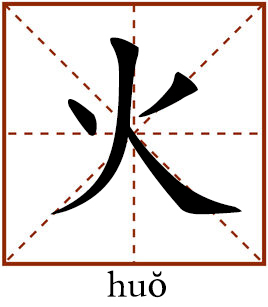Fire

When used as a noun, this character refers to fire. When used as a verb, this character means “to become popular.”
野火烧不尽
yě huǒ shāo bù jìn
Ye means “wild” while huo refers to fire. Shao bu jin means “can’t be burnt up.” This term depicts something that can’t be burnt by wild fire.
This term is derived from a poem by the Tang poet Bai Juyi (772–846). In this poem titled “Grass,” Bai depicts how he bade farewell to his friend on a grassland. “Grasses grow tall and flourish,/ then wither and die only to rise again;/ a wild fire may burn them,/ yet with the spring winds they will grow back again,/ their fragrance spreading over the ancient road/ which runs along old city walls leafed with green;/ I think of the young gallants who have ridden away from here/ After so many sad partings” (trans. Rewi Alley). The first half of the poem is most celebrated because it conveys the spirit of perseverance. The repetition of the term离 (li, signifies the lush vegetation in this poem) in the original poem emphasizes the abundance of the grass on the plain, while the repetitive use of the term 一 (yi, means “one”) represents the perseverance of the grass that withers in winter but always revives when spring comes. Even wildfire cannot burn it down forever.
It is said that Bai wrote this poem during an imperial examination at age 16. Because of the time limit and various requirements of the exam, there were few good poems composed during the imperial examination. However, this poem soon attracted public attention and made Bai popular at that time. Some believed that Bai compared his friendship with his friend to the grasses, something that was time-tested and that would continue to grow. However, most people admire this poem for the vigorous grasses it portrays and the spirit of perseverance it represents. It is often quoted to encourage people to be strong-minded and to persevere despite obstacles and setbacks. Today, the Chinese people often talk about the “spirit of wild grass,” which has the same meaning as depicted in Bai’s poem. Children are told not to live like the flowers in a greenhouse, but to live like wild grass that can grow everywhere, with no fear of wind and rain.
Edited by RENGUANHONG
